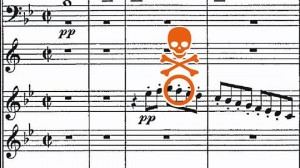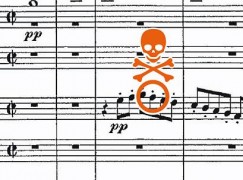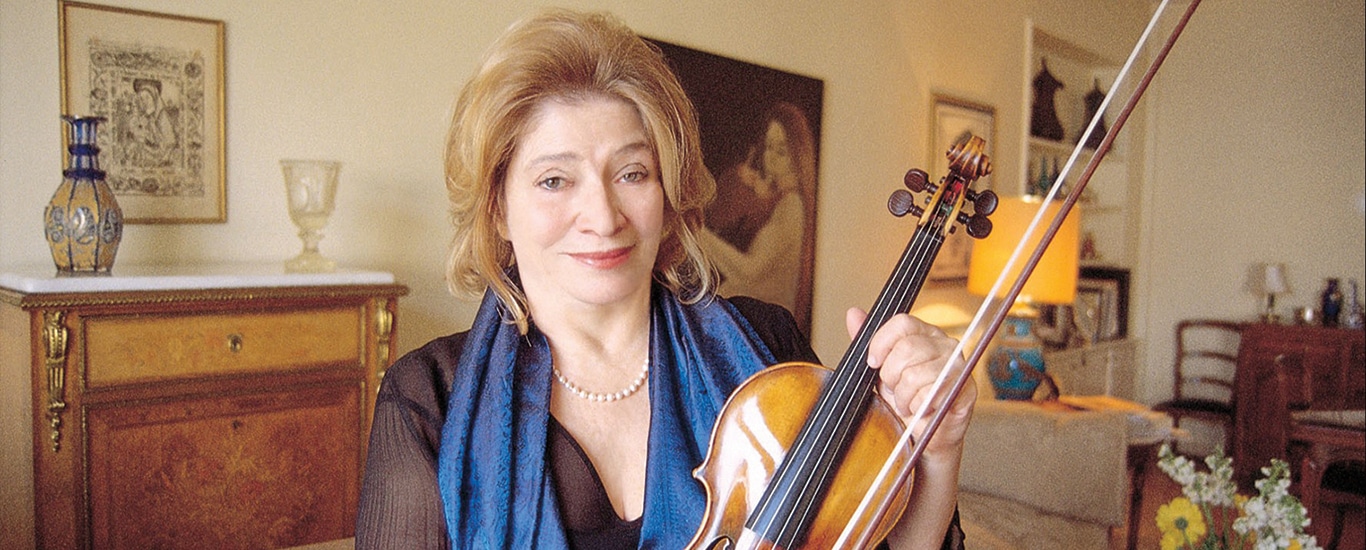Stop the presses: A wrong note from the Berlin Philharmonic
mainThe critic Wolfram Goertz is getting very excited about finding a falsie in a Schubert symphony conducted by Nikolaus Harnoncourt on the Berlin Phil’s selfie label. Goertz writes:
Beim Beginn der 5. Sinfonie unterläuft dem Orchester, das sich selbst für eines der weltbesten hält und es vermutlich auch ist, ein Malheur. Im dritten Takt spielen die ersten Violinen, eingekleidet von Holzbläsern, eine absteigende B-Dur-Tonleiter, die mit einem witzigen Aufschwung startet. Das zweite F dieser Violinen hört man auf der CD als einen Ton mit Schmutz dran. Da stimmt was nicht. Die meisten Berliner Geiger spielen F, daran ist kein Zweifel, aber eine Geige spielt falsch. Oder sie rutscht übers Griffbrett. Oder ihr Bogen verspringt. Der misslungene Ton fällt deshalb auf, weil die ersten Geigen blank daliegen wie auf dem Präsentierteller.
Would this ever have got past the note-pickers on DG?

Full album review here.






Germany’s 4th-best orchestra nowadays, and no need to list the top three!
Your comment reminds me of the Bob Dylan press conference in the mid-sixties when someone asked him how many protest singers existed:
Dylan thought for a second, then replied, “About 136.”
“You say about 136 — or exactly 136?” the reporter asked.
“Either 136 or 142.”
No, the Berlin Philharmonic is still the world’s greatest orchestra, which is why critics can still get press for making extremely nit-picky points on their playing that simply wouldn’t be relevant with anyone else. It’s also interesting that Berlin Phil critics make slapdash statements like “Germany’s 4th best orchestra” without any trace of real argument. Berlin still has the world’s richest, darkest, and flexible strings, the best wind soloists (beat Emmanuel Pahud, Albrecht Mayer, or Andreas Ottensamer!) and the most cohesive overall virtuosity.
To be fair, Jansons at the BRSO has outstripped Rattle and the Berliners for interpretive interest lately, partly because Rattle hasn’t been releasing enough. There’s certainly great talent in Germany’s other orchestras, no denying.
The Berlin Phil has always released recordings with missed notes, horn and trumpet fracks, or mistuned chords, even (especially?) during the DG/Karajan years. The list of examples is quite long… and I speak as a fan of the orchestra…
It’s really only the American orchestras, particularly Cleveland, that exhibit such an obsession with perfection in every detail. I believe it is due to a couple of different factors: 1) Berlin has historically recorded in long takes. Karajan, for all his (incorrect) reputation as a perfectionist, preferred a long expressive take with minor imperfections to a perfectly clean take that was cautious – if those were the choices at hand… 2) they tended to record so much more than other orchestras, so the odds of something slipping by has always been higher.
Most orchestral musicians can find such flaws in almost any orchestral recording.
I can’t speak for the Schubert example here, not having heard it, but if true, would be one of the more egregious ones, considering the simple texture..
Quite agree. Take for example Karajan’s Alpine Symphony. Setting aside for a moment its ludicrous engineering (think Phase 4 stereo at times!), the horns crack a good many notes and the playing is a long way away from “perfect” in the brasses. Then there’s the appalling trumpet clam at the very end of HVK’s Boheme Act 2. It’s just jarring. They must have heard it. Either they couldn’t be bothered with a retake or somebody used the wrong take on the final release. Check it out. Horrific.
The much vaunted 1982 Berlin Festival Mahler 9 is similarly peppered with cracked horn notes and some very odd moments in the strings, particularly in the second movement…. “a degree of technical address which, by normal standards of human perfectibility, was well-nigh incredible” said Mr Osborne in Gramophone. eh?
Nevertheless it’s a generally recommendable performance from a fine ensemble, but any band is only as good as its last concert, and I had hoped we had moved on from this ridiculous “world’s greatest orchestra” nonsense.
Personally, and while it doesn’t always float my boat, I have no problems whatsoever with any orchestra playing light or popular music, especially when it is as well done as it always is at the Waldbühne.
Are you the Jack Burt who played violen for Nurenburg while in Furth serving in the 2nd armored division?
Its much more concerning that Simon Rattle now is conducting Star Wars, Ben Hur or other cheap music for the masses at the waldbuhne, or that a violinist actually was playing with a bow masked as A LIGHTSABER!!
Since when did the Berlin Philharmoniker became Andre Rieu’s orchestra?
But anything reported here? I think not.
It’s on Youtube. Really a fun performance. The orchestra seems to be enjoying it (at least there are a few smiles – I think Sarah Willis is smiling as she plays…………or it looks like it). I do miss Maurice Murphy’s magnificent strident assertiveness though. That man could play!
‘Cheap music for the masses…!’
What a pillock you are….
And it was a VIOLA player that was using the light sabre! (It’s a ‘big violin’ – it plays a fifth lower than the violin).
Alvaro! For Pete’s sake just get a life!!!
What a pretentious snob you are! Or perhaps a resident SD troll? Best crawl back under your bridge.
I wouldn’t worry too much about those replies Alvaro. I agree with your criticism, and what you describe, together with the arbitrary and shallow nature of the replies here, all goes to underline the cultural decline we find ourselves in today, accompanied by the level of intolerance that goes with that…
While Mr. Goertz sounds a little excited about having found this “malheur”, one violin making a mistake did take the smile right off of Iván Fischer’s face, when he was conducting Stravinsky’s “Jeu de Cartes”:
https://www.youtube.com/watch?v=FPfIA71omyQ (at 19 seconds)
I am honestly less bothered by an occasional mishap and more bothered by orchestras that are so obsessed with glossy perfection that they sound as though they even rehearsed being spontaneous.
The real difficulty with this performance seems to be that the sound is so heavy and lacks any bouncing, dansant pleasure, it sounds really as a polite obligation.
When once asked if he was concerned about a (to some ears…) quite significant error, during a follow-up to a recording session, Karajan was reported as saying, “Bah – only a fish would hear that…..”
Didn’t Horowitz once say, when a journalist remarked on some of his wrong notes, simply say “But I’m Horowitz”?
There’s an ugly moment in Benny Goodman’s 1967 recording of the Nielsen Clarinet Concerto with Morton Gould and the CSO, a disturbing squeak in the first movement solo cadenza. Appalling that the RCA producer didn’t do or insert a retake which would have been so easy. (The Nielsen Second on the other side has a few rough moments but the performance is otherwise exhilarating though the last movement’s a bit too pressed.)
Mediocrities supreme delight – genius gone wrong!
“The Berlin Phil has always released recordings with missed notes, horn and trumpet fracks, or mistuned chords, even (especially?) during the DG/Karajan years. The list of examples is quite long… and I speak as a fan of the orchestra…”
One more example: Dvorak n. 8 with Kubelik.
But nevertheless. This is Great Orchestra.
The larger point is that many of the BPO recordings that have the occasional mistake are considered (rightly, in my mind) excellent recordings – because they are exciting, expressive performances…
A short brass players list of Karajan/BPO slip ups: Trumpet high Cs in Rite of Spring (DG 1964), Trumpet High Cs in Sinfonia Domestica (EMI, in the 70s’), Planets – Mars (m. 5 stinky chord! DG 1980) and too many to mention in Alpine Symphony (DG 1981), the worst of which was another trumpet frack in Auf dem Gletscher which was edited out in the CD transfer from the LP version… The big horn mess at the end remained!
Still, great recordings… which I love to listen to, because of the larger pleasure they give.
Film music by John Williams, Korngold, and Miklos Rosza is a far cry from Andre Rieu, especially when played with their customary expertise. eAnd it’s nice to see the Berlin Phil musicians showing that music can be fun.
I read the complete review. It seems like he invited some of his colleagues to listen to and they’re not exactly sure what it is a wrong note. Bowing, fretboard, at the end he says that the set overall is excellent and is worth getting. Reviewer doesn’t list any other mistakes. I would think if he mentioned this error he would mention other errors if they occurred. I own set and heard everything but the opera. My issues have to do with some of her imports choice of campers were changing temperatures within the movement where it’s not marked in the score.
I’d rather hear one wrong note than a clinical performance. It demonstrates that the music is being played by real people rather than machines. Professional Musicians tend to berate themselves enough over the slips they know they have made without critics blowing things out of all proportions.
Agreed. But those are not necessarily the choices to be had.
Here, it could be as simple as two exciting performances, but the editor chopped in the wrong-note version instead of the right-note version.
iPhone edits…my issues have mainly to do over choices of tempo. Changes of tempo not found in the score are found as well. That said, it is interesting set that I’m glad I purchased.
This wrong note is not as bad as the crack in the 2nd horn in bar 356 at the performance of ‘Ein Heldenleben’ on 12th March 1974 under Von Karajan, which led to 7 consecutive sleepless nights of the conductor, the firing of the horn player, 12 protests in the German newspapers and severe questions in the Berlin Senate.
On the next rehearsel Karajan expostulated his notorious opinion of the orchestra which has gone down into history as the moment when relations between orchestra and conductor began to erode: ‘Gentlemen, I would like to bind a big rope all around you, pour petrol over you, and light you terrible bunch.’
Either you are the best orchestra in the world or you are not.